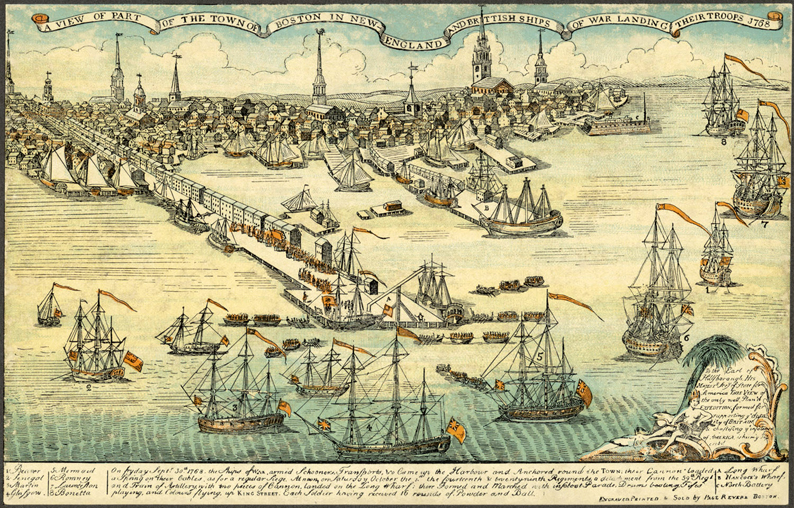Week 19: Revolution
250 years ago today, the tea started to hit the fan.
It’s a moment that had been steeping for a decade. Ever since the end of the French and Indian War in 1763 – a struggle that was part of the larger 7 Years War, that spilled out around the globe, and proved to be incredibly expensive – the British Parliament had looked to their colonies to generate tax revenue in order to pay for the massive cost overruns of that conflict.
The result was a series of Acts that the empire placed upon the colonists, one after another. The first was the Sugar Act in April, 1764. It levied a tax of 3 pence on a gallon of molasses, and similar taxes on other necessary items like sugar, coffee, some fabrics and, notably, rum.
That was followed by the Stamp Act in 1765, which placed taxes on just about anything printed, including public notices, personal letters, college degrees, bills and invoices, professional licenses, wills, stocks and bonds, you name it. And that same year came the Quartering Act, which required that colonials provide room and board to British soldiers out of their own pockets, and put up with rude, stinky lodgers hanging around their houses and farms, and messing with their daughters.
In 1766, the Declaratory Act was a massive bait-and-switch. On the one hand, Parliament repealed the hated Stamp Act, but at the same time they restated in no uncertain terms that they had the authority to tax the colonists in any way they wanted, and the colonists had no way to complain. In other words, get ready for complete ‘taxation without representation.’
Parliament made good on that promise in 1767, with the passage of a monster, the Townshend Revenue Acts. Taxes were placed on all kinds of things, such as glass, paint, oil, paper, lead and tea, and customs offices were strengthened to ensure greater compliance. That summer, the sloop Liberty, owned by John Hancock, pulled into Boston Harbor, and was suspected of importing those kinds of items without paying the taxes. Imperial officials boarded the ship and impounded it. In response, crowds of angry colonials mobbed the customs office. At which point British soldiers marched into Boston and locked down the city.
The merchants of Boston had had enough. They figured that if they were going to be treated as second-class citizens, they would take their business elsewhere. They started importing lots of expensive goods from places other than Great Britain. Tensions increased, until, on March 5, 1770, after an angry snowball fight between some ship workers and soldiers, the British opened fire, killing 5 colonists and wounding 6 others. The moment became known as the Boston Massacre. The people of Boston, and colonists all up and down the Atlantic seaboard, were enraged.
Which brings us to this critical moment, 250 years ago, May 10, 1773. Parliament is passing a new thing called the Tea Act. Interestingly, it doesn’t pass a new tax, but it orders that a huge surplus of tea that has been building up in England be sent to Boston, which the colonists will be forced to buy, and which will remind them that they are prohibited from getting their tea from anywhere else.
Parliament believes that by force-feeding America a lot of British tea, it will get those pesky colonists back in line.
Seems logical. So load up the boats and send them west. Should take them a few months to make the crossing.
Let’s just wait and see what happens when those ships full of tea pull into Boston Harbor…
(Subscribe to the Revolution in Real Time at Revolution250.blog)
